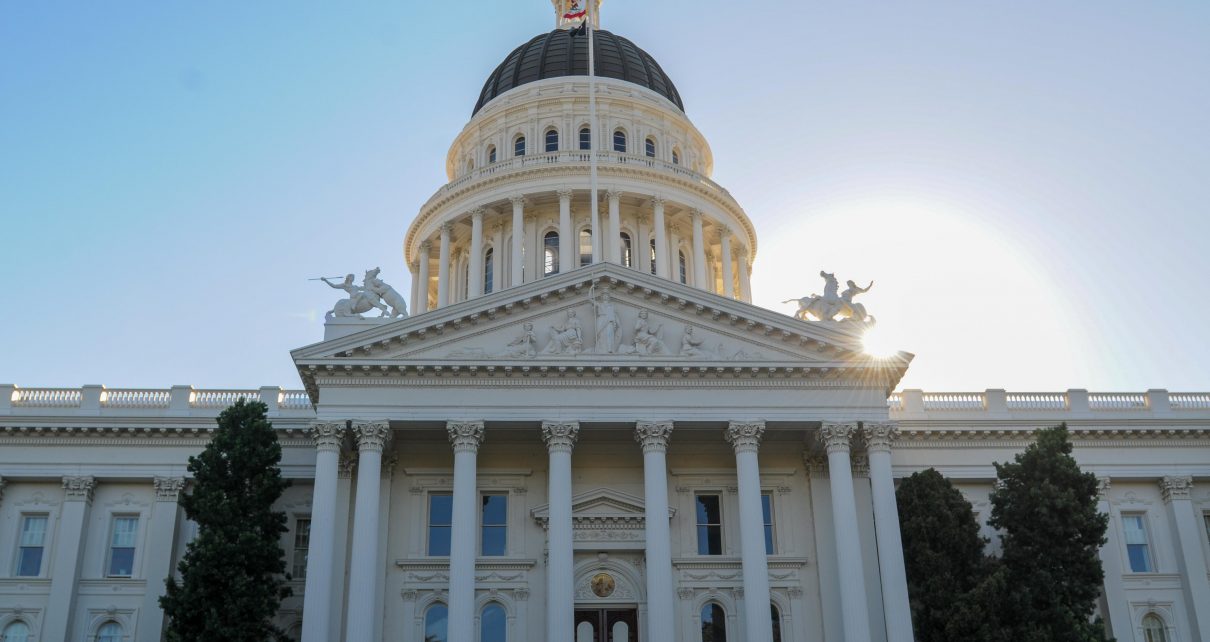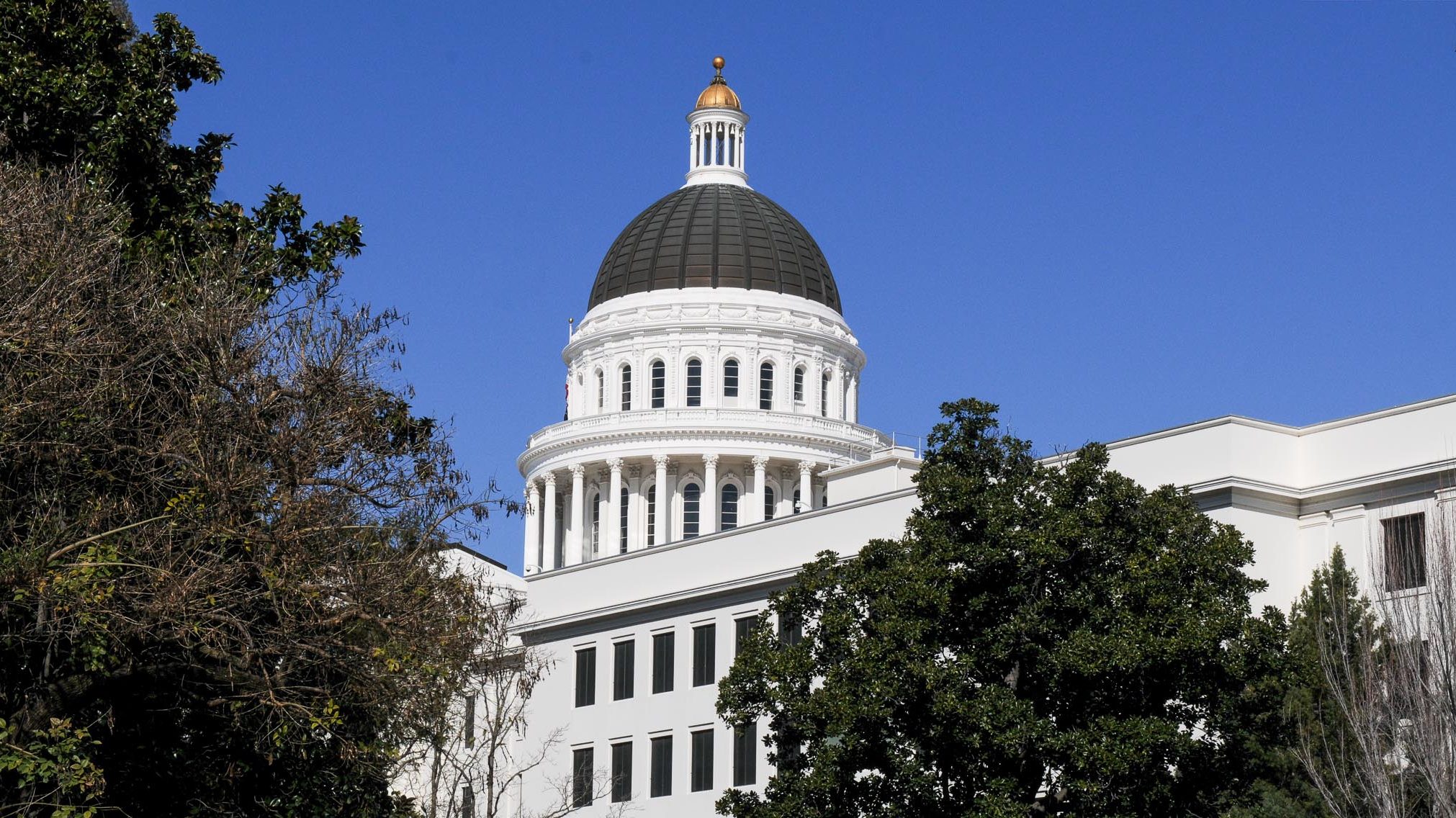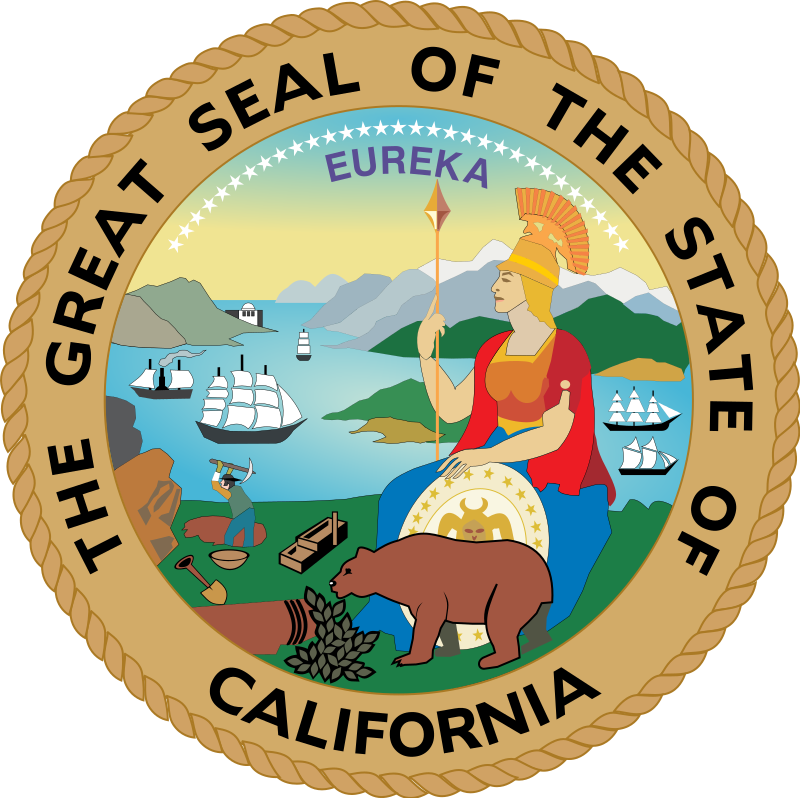
California State Capitol. (Photo: Kevin Sanders for California Globe)
The Food on Your Table is Literally at Stake
Tulare Lake subbasin court hearing August 22, 2024
By Don Wright, August 24, 2024 3:05 am
The unintended consequences of the Sustainable Groundwater Management Act (SGMA) continue to reverberate across the Central Valley. On Tuesday, August 20, 2024 there was a court hearing at the Kings County Superior Court that further tested the reach of state regulatory agencies.
In November, 2023 the State Water Resources Control Board members and staff held a meeting in Hanford to discuss the possibility of placing the Tulare Lake Subbasin on probation for not producing an adequate Groundwater Sustainability Plan (GSP). In an April 2024 meeting in Sacramento the State Board placed the Subbasin on probation.
On July 15, 2024 a coalition of farmers and the Kings County Farm Bureau petitioned the court to issue a temporary restraining order (TRO) against the State Board preventing it from charging local landowners extraction fees for pumping groundwater and collecting pumping data, which would force the installation of meters on wells. The petitioners also asked Judge Kathy Ciuffinito issue a preliminary injunction (PI) against the State Board’s decision to place the Subbasin on probation.
On Tuesday, August 20, 2024 Judge Ciuffini heard arguments for and against issuing the PI from the plaintiffs and from the state. Ciuffini didn’t rule on the PI but did extend the TRO until Friday, September 13, 2024 when the matter is scheduled to be heard again. However, it is possible Ciuffini could issue a written ruling before then.
“While we would have liked to have gotten a ruling today, KCFB appreciates Judge Ciuffini’s attention to detail and careful consideration of this monumental decision,” said Dusty Ference, Executive Director of the Kings County Farm Bureau in a press release to WaterWrights.net.
The release also stated, “KCFB has invested more than $170,000 to protect your right to farm and heritage. You can help California agriculture achieve success in this battle by contributing to the SGMA Defense Fund. Your entire investment goes toward this effort.”
The Issues
Due to continuous diversions of contracted surface water away from the San Joaquin Valley growers have been forced to pump more groundwater. Overdraft of the aquifer has taken place in many areas and must be addressed. SGMA was the legislature’s effort to deal with overdraft.
California is divided into hydrologic basins and further divided into subbasins. SGMA was passed in 2014 and is meant to bring all of the state’s aquifers into balance – meaning no more groundwater could be pumped than was recharged.
SGMA required the subbasins to form Groundwater Sustainability Agencies (GSA) by 2017. Ten of the 12 subbasins in the San Joaquin Valley are considered critically overdrafted. All critically overdrafted subbasins were required to complete GSPs (Groundwater Sustainability Plan) by midnight, January 31, 2020. The GSPs detail how the subbasins will achieve sustainability by 2040. All of the San Joaquin Valley subbasins have met the GSA formation and GSP completion deadlines.
California’s Department of Water Resources (DWR) is tasked with reviewing GSPs. If DWR finds the GSP inadequate the GSAs could and should rewrite them. If DWR finds these revised GSPs still don’t meet its evaluation criteria the subbasin is passed on to the State Board. The State Board will then determine whether or not to place the subbasin in probation. The Tulare Lake Subbasin, located almost entirely within Kings County, was placed in probation. It was the first subbasin to be placed in probation. You can find out more about the probationary process here.
What Probation Does
At the November 2023 meeting in Hanford, it was revealed the fees and penalties the State Board could impose if the Tulare Lake Subbasin is placed in probation would total more than $30 million annually with a 25-percent monthly late fee. This was later revised down to more than $20 million by reducing the amount charged per acre foot of pumping. This money is designated by SGMA to cover the State Board’s costs for managing a subbasin in probation.
If after one year on probation the subbasin hasn’t been able to write a GSP approved by the State Board, the State Board will step in and allocate how much groundwater can be pumped. This is the big incentive for subbasins to get their GSPs passed because the allocations will be very limiting and very expensive – especially for the small farmers who make up the majority of growers in the Tulare Lake Subbasin.
Taking It To Court
State law dealing with regulatory powers has specific procedures that must be followed. SGMA is subject to this and has procedures of its own that includes a “Good Actor” clause. A good actor is an area of a subbasin that has developed an adequate GSP and can be sustainable on its own despite the rest of the subbasin’s inability to do so.
SGMA is in reality a legal requirement to build an entirely new layer of government – GSAs. These GSAs are legally required to write a document without precedent – a GSP. Until now no one has ever written a GSP before. SGMA lists six undesirable results that must be avoided but doesn’t say how to do so. There is a great deal of data needed to figure out how to avoid the undesirable results and be sustainable by 2040. The five GSAs in the Tulare Lake Subbasin combined spent more than $3 million preparing their GSP.
There are no voices within the San Joaquin Valley making claims it is unnecessary to avoid the consequences of aquifer overdraft. None claiming the State Board doesn’t have a legitimate role to play. However, some people in the Tulare Lake Subbasin are claiming the State Board didn’t follow SGMA and asked the court to intervene.
The Latest Hearing
Here is a brief rundown of what took place at the August 20th hearing:
Representing the plaintiffs before Judge Ciuffini was water law attorney Valerie Kincaid. Margaret Tides, of the state’s Attorneys General Office represented the State Board. The August 20th afternoon hearing had less than two dozen spectators in the courtroom, mostly local farmers and landowners impacted by the probation decision. The hearing lasted no more than two hours. Before the public portion began Ciuffini announced the TRO would stay in place until the September 13th hearing.
The State’s Position
Tides began by telling the judge the TRO is preventing the State Board from fulfilling its requirements under SGMA. She said for an injunction to be issued the plaintiffs would have to show injury and they haven’t done so. She said public interest was at stake as subsidence – the collapsing of the aquifer from overdraft in some soil types – is irreversible and causes damage to infrastructure.
Tides also cited the problems of contaminated water and domestic wells going dry from over-pumping. She said 100 domestic wells in the subbasin have gone dry and cited declarations obtained from organizations purporting to represent social and environmental justice to back up these claims.
It wasn’t mentioned that many of these non-governmental organizations cited also receive large grant funding awards from the State Board. Nor was it mentioned why the wells went dry. Many domestic wells are old and have outlived their useable life span. They can stop producing due to casing collapse, well screens clogging or other reasons not caused by aquifer drawdown.
The gist of Tides’ argument was the injunction shouldn’t be granted as the plaintiffs failed to make a clear showing or offer evidence they have been harmed by State Board actions.
Prior to the public portion of the hearing Judge Ciuffini spoke privately with the parties and asked them to answer some questions. During the public portion the attorneys responded.
One of questions given to Tides was – did the State Board engage in underground regulations when placing the Tulare Lake Subbasin in probation?
From an article in the California Globe written by law professor Chris Micheli – According to the Office of Administrative Law, “if a state agency issues, utilizes, enforces, or attempts to enforce a rule without following the APA (California Administrative Procedure Act) when it is required to, the rule is called an ‘underground regulation.’ State agencies are prohibited from enforcing underground regulations.”
Tides’ answer was the State Board has discretion to implement laws such as an emergency fee action and has the authority to regulate. The State Board’s actions are covered under SGMA and the State Board has the discretion to decide if further procedures are needed.
Another question was why the State Board didn’t consider the Good Actor clause for any of the GSAs in the subbasin even though one, the Tri-County GSA has no chronic lowering of groundwater. Tides responded the GSP was submitted as a unified plan for the entire subbasin.
Evidently if the GSAs had written separate GSPs that could be divided to allow for Good Actors. A Good Actor must show compliance with sustainability and a have a functional plan. Two state agencies determined that wasn’t taking place in the Tulare Lake Subbasin. Both DWR and the State Board came to that conclusion after reviewing the GSP.
Tides concluded that no injury to the plaintiffs has taken place since there is a TRO blocking enforcement and without enforcement there was nothing to cause harm. There is also urgency for the State Board to collect more data. She maintained it is in the public’s interest to continue with implementing the probation. Therefore, the injunction should not be issued.
The Subbasin’s Position
Kincaid told the judge the State Board’s opposition to an injunction has three main flaws. First the injunction doesn’t stop SGMA. The Tulare Lake Subbasin still has to implement solutions and the State Board can still keep moving. Second the GSAs’ management is still active and ongoing including data collection. And third – she asked, what does the State Board want to do?
Kincaid maintained the State Board hasn’t offered a plan or any list of actions it wants taken. The declarations offered by the State Board don’t show results of any harm. She said the GSAs are the public and they are managing specifically to the Tulare Lake Subbasin. While the State Board is not conducting anything specific, but rather generalized to the entire state and that is not tied to forbidding an injunction.
According to Kincaid the plaintiffs will prevail on the merits of the case. The State Board doesn’t have the leeway to not invoke the Good Actor clause when warranted. It is required under SGMA to consider the entire subbasin and the parts. It didn’t do so.
In the past the State Board has directed staff to implement a Diversity, Inclusion and Equity lens to decision making within the agency. They didn’t adopt the resolution offered so there is nothing to protest but a board direction. On a similar note Kincade said the State Board must adopt regulations in a procedure that includes evidence to apply to the subbasin. That wasn’t done and that is an example of underground regulations.
The State Board hasn’t explained the services and costs it wants to charge against the fees proposed. It was asked, what services is the State Board providing? As an example, one item from the April 2024 probation determination was the State Board will provide a liaison specific to the Tulare Lake Subbasin. Kincaid (and many others have) asked who this person is and when will they engage with the Subbasin.
Kincaid believes the State Board’s claim that harm would take place wasn’t based on the required public comment needed because the State Board hasn’t provided that opportunity. Another point of confusion is a declaration given by a State Board staff stated the State Board Executive Director could make administrative decisions regarding the subbasin while at the same time stating the staff could so as well. Kincaid said this is a contradiction.
Kincaid said the GSAs in the subbasin are collecting data and happy to provide the State Board with results. The GSAs are not collecting the data at the onerous costs the State Board wants. The State Board hasn’t shown what harm that will cause.
Tides responded this is misinformation. The State Board doesn’t make the GSPs, that is the responsibility of the GSAs. She said the State Board staff report used to justify probation does show there would be harm from an injunction. She said if fees are not collected from the Subbasin the rest of the taxpayers in California will have to pay. She also said the State Board’s noticing to landowners shouldn’t be an issue as the Kings County Farm Bureau newsletter was informing the Subbasin of probation as far back as fall of 2023.
Ciuffini asked when those subject to pumping fees were specifically noticed. Tides responded the State Board met all notice requirements and the plaintiffs have not shown harm on this point.
Kincaid said there is a big difference between a public and a specific notice. The State Board didn’t send notices to the Subbasin until June.
The hearing was scheduled to start at 1:30pm and it ended at 4:00pm. Both sides had their say. At the beginning of the hearing Ciuffini disclosed she is in the Rotary Club with one of the attorneys who has represented the Farm Bureau in other matters. Although she doesn’t socialize with that person she asked if either party had reservations. Neither had any objections so it falls the hearing was conducted by a nonbiased judge acceptable to all concerned.
There are five other subbasins in the San Joaquin Valley facing probation. All have their stories to tell. All are watching this case closely. Often laws, even the best intentioned, have unintended consequences. SGMA more so than others. When it first passed there were many jokes about attorneys and engineers parachuting into California to reap a profit.
The state and federal government’s previous water regulations have cut surface water deliveries to the San Joaquin Valley by 50 percent in the past few decades. You can’t recharge aquifers without surface water. This is the root cause of overdraft in the Valley and the solution will require trust by the citizens that the government is acting in a fair and competent manner. The food on your table is literally at stake.
- The Food on Your Table is Literally at Stake - August 24, 2024
- The Value of a Safe, Affordable and Consistent Food Supply - June 28, 2024
- Mayday! Mayday! - May 4, 2024





For one thing we could quit growing thirsty alfalfa for Arab horses in Saudi Arabia. And I do not see why we bother to grow cotton – another high water, low dollar crop.
And lastly, I hear we have rivers washing millions of acre feet of fresh rainwater out to the ocean since the ancient water basins (AKA Seasonal storage) have had their flows redirected to those same rivers. Off to the ocean goes your water, peon.
It is a shame we can’t spray for bureaucrats like we do for other pests.
As usual these days, the comedians have the best insight. I would agree! reducing water-intensive exports, prioritizing crops with higher economic value, and investing in better water storage infrastructure Just seems like common sense. Make a tax on the water if you’re exporting it!
Yes, it’s a shame. I wish we could find a way to deal with the pests… Moving away from mono cultures in thought are probably the first start.
Of course it is: The comrades intend to take dominion over the three essentials of Life; food water and shelter.
Are you sure these are unintended consequences ?
2 things. First they have severely limited farmers availability to surface water that flows from the Sierras to the ocean. Secondly a couple of years ago the Tulare Lake basin was an actual lake because of the water that was piling up that winter. We see what we know, these folks want to further enslave us. Our only recourse is to fight, fight, fight.